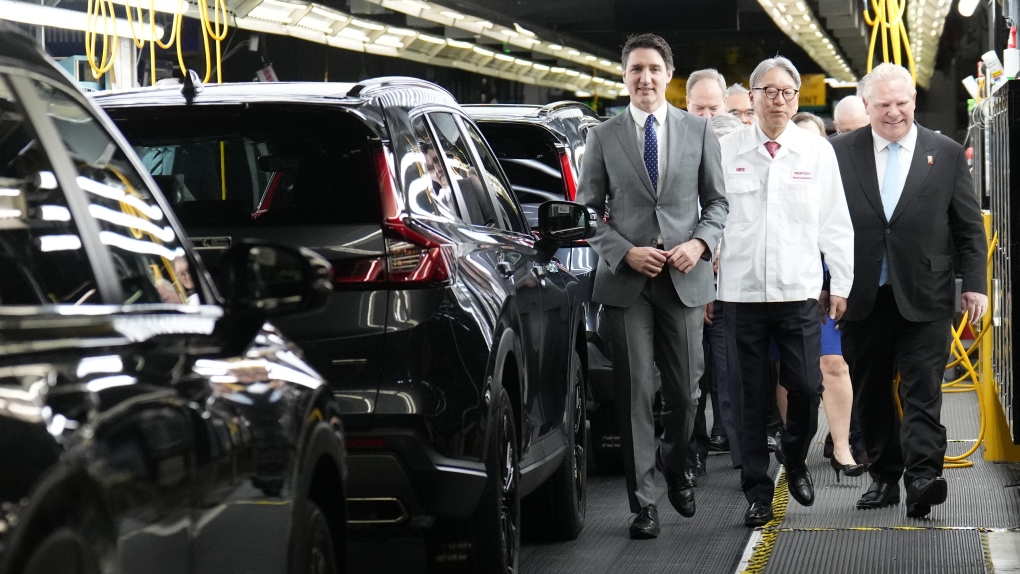Honda to get up to $5B in govt help for EV battery, assembly plants

Honda is set to build an electric vehicle battery plant next to its Alliston, Ont., assembly plant, which it is retooling to produce fully electric vehicles, all part of a $15-billion project that is expected to include up to $5 billion in public money.
The two plants are expected to create 1,000 jobs on top of retaining the existing 4,200 jobs at the assembly plant.
- Watch Honda announcement live here
The deal does not involve production subsidies, which were used to woo two other automakers to build battery plants in Ontario instead of the United States with its incentives under the Inflation Reduction Act.
But the federal government is expected to give the Japanese automaker around $2.5 billion through tax credits for clean technology manufacturing and electric vehicle supply chain investments.
Ontario has committed to providing up to $2.5 billion directly – such as for capital costs – and indirectly, such as covering site servicing costs.
The $15-billion project includes the retooled plant, an electric vehicle battery plant nearby, as well as two key battery parts facilities – for cathodes and separators – located elsewhere in Ontario.
The Honda facility will be the third electric vehicle battery plant in Ontario, following in the footsteps of Volkswagen in St. Thomas and a Stellantis LG plant in Windsor.
The deal comes after years of meetings and discussions between Honda executives and the Ontario government, which began after the last big government announcement at Honda’s Alliston facility.
Prime Minister Justin Trudeau, Premier Doug Ford and Honda executives were on hand in March 2022 when the Japanese automaker announced hybrid production at the plant, with $131.6 million in assistance from each of the two levels of government.
That kickstarted conversations about a larger potential investment into electric vehicles, and negotiations began that summer.
In the midst of those negotiations, in May of 2023, Stellantis and LG stopped construction on their $5-billion electric vehicle battery facility, as they pressed the federal government to match what the United States would offer under its then-new Inflation Reduction Act.
They ultimately reached a deal with Canada and Ontario that will see the companies receive performance incentives of up to $15 billion over about 10 years.
The offer was also extended to Volkswagen for its electric vehicle battery facility and that deal could see up to $13 billion in incentives.
Deputy Prime Minister Chrystia Freeland has said large production incentives were necessary for both Volkswagen and Stellantis to help establish Canada’s green economy and ensure the companies were not lured away to the United States by the benefits under the IRA.
The federal government later indicated that tap was turned off, and Fedeli said in an interview that it didn’t derail the negotiations with Honda.
“Production incentives were meant to match the American production incentives, but it’s just far too much to continue with on an ongoing basis,” he said.
“I think they were good to get started, but the rest of the industry now is starting to realize, right across North America, that you need to be where you really should be for the talent, clean energy and critical minerals.”
The other two battery plants in the works have also started to draw other parts of the supply chain, Fedeli said, which became another part of the pitch for Honda – and perhaps others.
“We wanted EV manufacturers, we wanted a couple of battery manufacturers, and now we’re filling in the major supply chain: cathode, anode, separator, electrolyte, copper foil, lithium hydroxide, those six major components,” he said.
“We still have some room in our incentive packages for that line of six. After that, the incentive is: we brought you a customer. We brought you a battery maker … You have to go and do your deal with them. You have enough incentive to come here.”
This report by The Canadian Press was first published April 25, 2024.
View original article here Source









